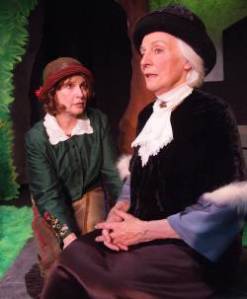Southern Comforts
March 22, 2011 Leave a comment
 At first blush, Kathleen Clark’s Southern Comforts feels like it may end up being a little thin, but by the end of the first scene, you are utterly charmed by this December-December romance that’s gaining momentum before your eyes. The success of this play is, in part, due to the fine performances by Michael Learned and Granville Van Dusen and the playwright’s skill at telling an engaging two-person story that easily spans multiple decades.
At first blush, Kathleen Clark’s Southern Comforts feels like it may end up being a little thin, but by the end of the first scene, you are utterly charmed by this December-December romance that’s gaining momentum before your eyes. The success of this play is, in part, due to the fine performances by Michael Learned and Granville Van Dusen and the playwright’s skill at telling an engaging two-person story that easily spans multiple decades.
Amanda Cross (Learned) is a fiery Southern widow from Tennessee visiting her daughter in New Jersey. One day, out on church business, she meets Gus Klingman (Van Dusen), a curmudgeonly widower who’s never ventured out of his hometown except to fight overseas during World War II.
Caught in a downpour, Gus invites her to sit out the rain while they enjoy a baseball game. In short order, they begin to have feelings for each other. She moves in, helps Gus install storm windows and, in a laugh-out-loud discussion about eternal resting places, they shop for headstones. As they slowly fall in love, they reveal their backstories, fleshing out this hilariously witty play. By the end of Act II, not even the somber reality of death can wipe the grin on your face.
Southern Comforts tackles many issues involved finding love late in life, arguing that even so, it’s never too late. Gus reveals that he had been in a loveless marriage for so long that it became comfortable to be unhappy. Amanda, in turn, offers a sober look at the war’s devastation to those left behind on the home front.
Settling into one another is not going to be easy but the playwright’s ear for realistic dialogue and her sense of humor keeps the complications that develop grounded and without sentimentality. This homage to love encompasses not only to those in their later years, but resonates easily with anyone who has ever had to make room (figuratively and literally) for another person in their life.
Learned’s Amanda is brash, outspoken, and demanding, and still she manages a sweetness that’s endearing and touching. Van Dusen’s Gus is nervous, put off, and completely loveable. The on-stage chemistry definitely buoys this affable production, skillfully directed by Jules Aaron.
Performances through April 10 at International City Theatre in Long Beach. For tickets and information, please call 562-436-4610 or visit www.internationalcitytheatre.org.



 Bitter Lemons
Bitter Lemons Picktainment
Picktainment EdgeLosAngeles
EdgeLosAngeles LA Stage Alliance
LA Stage Alliance Askew Theatre Company
Askew Theatre Company Hollywood Fringe Festival
Hollywood Fringe Festival LA Radar Festival
LA Radar Festival Goldstar
Goldstar Plays 411
Plays 411